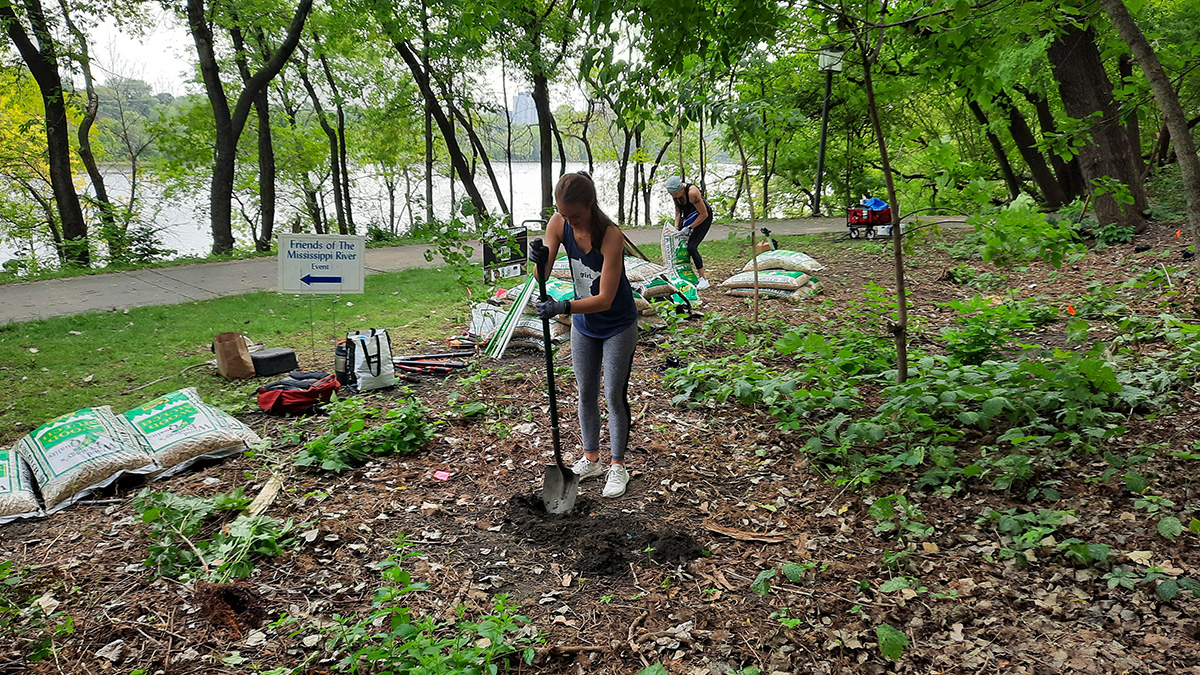Neighborhood takes the lead on restoration
At James I. Rice Park in Minneapolis, a neighborhood community saw a need for restoration of their beloved park and banded together to make it happen.
A community-driven restoration at James I. Rice Park provides a new stewardship model for beloved parks — we provide technical guidance, but neighbors lead. Here's how it started.
Local love for a park turns into dedication
At 16 acres, James I. Rice Park in the North Loop neighborhood of Minneapolis is among the smaller parks in the Minneapolis Park & Recreation Board system. But its size doesn't diminish how special it is to the community of people who spend time in this stretch of woodland along the Mississippi River, or how important it is for providing habitat and water quality benefits.
From early morning until dark, people move through the park trails, finding peace and calm along the banks of the river in an often-busy part of the city. Wildlife abounds just a stone's throw from downtown Minneapolis.
However, over time, a beloved place can start to show wear. Heavy use, trash and yard waste were beginning to degrade the park's beauty and ecological function. Foot traffic across the sandy slopes had created bare areas in the park increasing erosion. Invasive plants dominated the shrub and ground layers, reducing native plant diversity and limiting the site's habitat value for birds, pollinators and other wildlife. Some areas were so shaded by invasive shrubs that the woodland ground was bare, contributing to erosion and soil movement into the river.
A few years ago, a group of neighbors and frequent park users saw these issues and jumped into action. With a modest amount of funding from their North Loop Neighborhood Association and support from the Minneapolis Park & Recreation Board, these community volunteers organized work days to collect trash, pull weeds, cut back invasive shrubs and return ecological health to a place that was important to them. Many properties in the neighborhood don't have outdoor space — these neighbors came to see the park as their shared backyard and dedicated themselves to its restoration.
A "volunteer-centric" management plan for James I. Rice Park
James I. Rice Park is managed by the Minneapolis Park & Recreation Board, and park board staff identified a need for the community volunteers to be guided by a thoughtful planning process and technical knowledge. Through a long-standing partnership between the park board and FMR, park board staff engaged FMR ecologists to assist the neighborhood association with restoration efforts.
We saw an opportunity for a connection deeper than a one-off volunteer training and immediately sought funding to write a management plan that would engage and guide the community in their restoration efforts.
In 2021, the Mississippi Watershed Management Organization awarded a planning grant to FMR, which covered FMR staff costs to document the park's historical and current conditions, hold engagement events to understand the community's goals for the park and develop a comprehensive management plan.
Typically, FMR implements management plans by hiring subcontractors who employ crews to carry out restoration tasks over several years. But because James I. Rice Park has a committed crew of volunteers with growing ecological knowledge, we wrote the park's management plan specifically for the community to implement.
The plan, completed in 2022, outlines straightforward tasks that small groups of people can complete in a few hours. We also organized tasks by time of year and work units within the park.
As with other management plans, the goal is that the ecological conditions will improve over time, and the park will become more self-sustaining, needing only a small amount of yearly tending for a healthy, balanced landscape.

At input sessions, community members got a say in what restoration would look like for their park, including preferred methods for invasive species removal, target plant communities for certain units, and specific species to be seeded and planted throughout the park.
Community stewardship as a foundation
Interestingly, management and restoration plans are typically developed and implemented in the reverse order. First, a land steward such as a city or corporation reaches out to FMR to assist. FMR develops a management plan that documents site characteristics and plans ecological restoration and thoughtful human access. Then we typically implement the plan using grant funding and private contractors.
With restoration underway, FMR’s dedicated community volunteers then bolster this on-the-ground work. Not only do the lands benefit from hands-on service, but volunteers also become even more connected to these spaces and develop a sense of stewardship as ecological health returns.
For James I. Rice Park, that sense of stewardship came from an existing dedication to a special place, and the work followed from there.
A new model for other parks
While this was FMR's first time creating a volunteer-centric management plan, it certainly won't be the last.
In fact, we're already partnering with the park board, the Bryn Mawr Neighborhood Association and the Bassett Creek Watershed Management Commission to employ a similar model to restore the natural areas at Bassett's Creek Park in Minneapolis.
When it comes to habitat restoration, there is no "one size fits all" method for planning and implementing a restoration project. But as with most of FMR's restoration sites, volunteers and community members are among our greatest assets. The more a community cares for their neighborhood natural areas, the better. We envision this model spreading to other beloved parks throughout the Twin Cities Metro.
Join us!
Help us restore special places around the metro Mississippi. Check out our events calendar, sign up for our e-newsletter to stay current on volunteer opportunities, or email volunteer@fmr.org and we'll add you to the email list for the FMR stewardship program and events nearest to you.

Thank you, volunteers! (Photo by Mississippi Park Connection)
